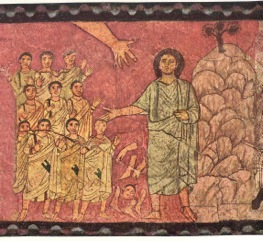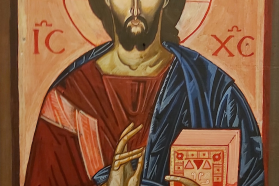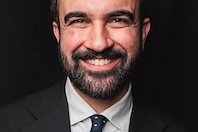Sunday Reflection with Fr Robin Gibbons - September 6 2020

Ezekiel
Twenty-third Sunday in Ordinary Time
Do you believe in these words of Jesus: 'I say to you, if two of you agree on earth about anything for which they are to pray, it shall be granted to them by my heavenly Father. For where two or three are gathered together in my name, there am I in the midst of them.' (Mt 18:19,20) In one sense we are well prepared for the second part about gathering in Christ's name, there is a long tradition in liturgical theology of the ways in which Christ mediates presence, this was reinforced by the Liturgy Constitution of Vatican II. Just to remind us, Christ is present in the gathered community, in the person of the minister presiding particularly at the Eucharist, in the Word proclaimed in scripture but most importantly in the Gospel, and in an immediate and raw way in the elements of the Eucharistic feast those consecrate gifts transformed by the Spirit.( Sacrosanctum Concilium 7 & 8)
But how do you take Jesus' statement about our agreement of a specific prayer request being granted?
I have some honest difficulties with that. In my 42 years of priestly ministry, I have heard many people come together to plead with God for deliverance from issues, to change the situation of iniquity and violence, to help us transform a corrupt society or situation and see no evidential result in a lot of cases, little relief for those in trouble. This is something we all have to deal with on our faith journey, why is it that despite the promises of Jesus, all too often the answer is a long silence?
There are answers, but I am not going to go down the route of glib statements such as:' God does answer prayer but not in the ways we want'. That is a bit too easy and does nothing for those in genuine distress or with heavy burdens on their backs; it is also very difficult to convince people that God is 'in it with us'. Many don't care; they want an answer, a sign, help, and genuine help-not well meaning piety. Maybe the prophet Ezekiel can help us? The problem about my comment is that about me being locked in to my/our own perspective. Ezekiel begins with the idea that a prophet calls out sin, gets people back to God by taking them out of their immediacy, points to a future of well being, or if we don't change, woe!
Yet that is not all a prophet like Ezekiel is called to do, they aren't doomsayers; their ultimate message is of hope. The prophet names sin, points out evil in order to contrast it with the good, the noble, the best we can be! They call out our sinfulness, not to destroy but to confront us with what is unequal, unjust, impure, destructive in human society. It is very much as the writer of Romans puts it to us: "You shall love your neighbour as yourself. Love does no evil to the neighbour; hence, love is the fulfilment of the law".(Rms 13:9b,10)
Isn't that the real purpose of our prayer too, not necessarily to use God as a magic wand, but to let the Most High open our hearts to what is necessary in life, to see the source of what is wrong and the hope and power of what is right?
Remember we are given strategies to deal with things in our Scriptures, Jesus leaves us many examples, such as the gentle way of dealing with wrong doing, three main stages, individual discussion, which is also respectful of people's privacy, if that doesn't work two or three trusted people to help in changing the situation by dealing with 'facts' (note that and the implication of privacy!). The third stage is to present the problem to the community and if nothing changes with discussion and discernment, then alas, we have to avoid the person for the time being, to make sure that argument does not become prejudice and misinformation but also to provide a 'space' for careful reflection without rancour .
That seems to me to be a more mature way of seeing God in action, of using us, Christ's sisters and brothers as a living prayer to help change things. Most of what we pray for can be helped by a more open and constrictive application of Christian love, dealing as the prophets point out, with the evil amongst us by rooting it out, changing our horizons and being less stubborn, changing what we can, standing together. There is much truth in that adage, 'God loves a cheerful giver'!
Lectio Divina
From the Rule of Saint Benedict
Chapter 20: Reverence in Prayer
1 Whenever we want to ask some favour of the powerful, we do it humbly and respectfully, for fear of presumption. How much more important, then, to lay our petitions before the Lord God of all things with the utmost humility and sincere devotion. We must know that God regards our purity of heart and tears of compunction, not our many words. Prayer should therefore be short and pure, unless perhaps it is prolonged under the inspiration of divine grace. In community, however, prayer should always be brief; and when the superior gives the signal, all should rise together.
Chapter 27: The Abbot's /Abbess Concern for the Excommunicated
The abbot/abbess must exercise the utmost care and concern for wayward brothers/sisters because it is not the healthy who need a physician, but the sick (Matt 9:12). Therefore, he/she ought to use every skill of a wise physician and send in senpectae, that is, mature and wise brothers/sisters who, under the cloak of secrecy, may support the wavering brother/sister, urge him/her to be humble as a way of making satisfaction, and console him/her lest (s)he be overwhelmed by excessive sorrow (2 Cor 2:7).
Rather, as the Apostle also says: Let love for him/her be reaffirmed (2 Cor 2:8), and let all pray for him/her. It is the abbot's/abbess responsibility to have great concern and to act with all speed, discernment and diligence in order not to lose any of the sheep entrusted to him/her. He/She should realize that he/she has undertaken care of the sick, not tyranny over the healthy. Let him/her also fear the threat of the Prophet in which God says: What you saw to be fat you claimed for yourselves, and what was weak you cast aside (Ezek 34:3-4). He/She is to imitate the loving example of the Good Shepherd who left the ninety-nine sheep in the mountains and went in search of the one sheep that had strayed, So great was his compassion for its weakness that he mercifully placed it on his sacred shoulders and so carried it back to the flock (Luke 15:5).
Fr Robin is an Eastern Rite Catholic Chaplain for Melkites in the UK. He is also an Ecumenical Canon of Christ Church Cathedral, Oxford. You can follow him on Twitter: @RobinGibbons2


















